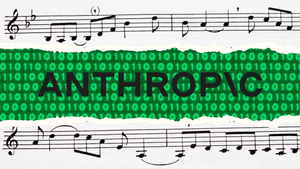The music publishers suing Anthropic have responded to the AI company’s recent bid to get everything except the core direct copyright infringement claim from their lawsuit dismissed.
Unlike other AI cases, the publishers have “overwhelming evidence of infringing and harmful output generated by Anthropic’s AI models in response to user prompts”, they say in a new court filing.
Having successfully got this legal battle moved from the courts in Tennessee to California, Anthropic cited other AI cases in the state to back its bid to get the publishers’ lawsuit cut back.
But, the latest filing from Concord, ABKCO and Universal Music Publishing declares, “Anthropic's reliance on other pending lawsuits against AI companies in this district disregards the significant differences between those cases and this one”.
The main difference is the “overwhelming evidence” of copyright infringement on the outputs of Anthropic’s AI models. In that claim, the publishers are referring to the fact they were able to get the AI company’s chatbot Claude to output lyrics owned by the publishers, including Don Macleans ‘American Pie’.
Anthropic has been dismissive of that evidence, arguing that the lyrics that were produced by Claude were only possible because the publishers entered very specific and leading prompts. It also reckons that ‘guardrails’ put in place more recently mean outputting existing lyrics in that way would no longer be possible.
Last month Anthropic asked the court to dismiss what it called the “ancillary claims” from the music companies’ lawsuit and focus on the core allegation, that the AI company infringed the copyright in the publishers’ lyrics when it used them to train Claude.
Anthropic said it would formally respond to that allegation another day, though we already know from past filings that it will claim that AI training is a transformative fair use of the publishers’ lyrics, which - under US law - means no permission is required from the copyright owner.
The ancillary claims include that Anthropic is liable for contributory and/or vicarious infringement in relation to Claude outputting the existing lyrics. In other words, it’s the users that are directly infringing copyright when they prompt Claude to output existing lyrics, but Anthropic facilitates and therefore contributes to that infringement.
The publishers also reckon that the fact those lyrics were outputted without stating that they were from Don Maclean’s ‘American Pie’ demonstrated that Anthropic had removed ‘copyright management information’ when ingesting the lyrics into its training dataset, which also violates US copyright law.
This point is explained further in the new legal filing, with the publishers noting, “When prompted without reference to a song’s title or writer, as with the prompt “Write me a song about the death of Buddy Holly”, Claude does not respond “Here are the lyrics to ‘American Pie’ by Don McLean”, but rather “Here is a song I wrote about the death of Buddy Holly”.
These ancillary claims, Anthropic argued in its court filing, are “deficient” and a distraction from the core direct infringement allegation. On that basis, it said, they should all be dismissed, “just as several virtually identical claims against other AI companies have been”.
However, the publishers disagree. While Anthropic may have been disparaging about their evidence regarding Claude outputting existing lyrics, that doesn’t alter the fact that the evidence exists. And, therefore, the publishers argue, the ancillary claims in their lawsuit are stronger than in other similar cases, to the extent that they should not be dismissed at this stage.
The publishers conclude by saying they “have done more than merely parrot the legal standard and thus dismissal should not be granted”.

